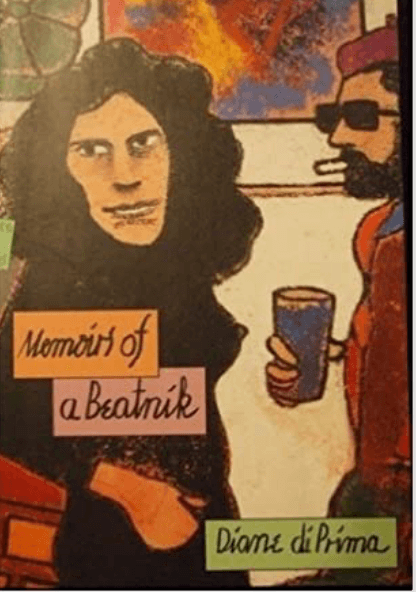
How much of her stories were true, no one will ever know, especially now that she’s dead. Maybe it doesn’t matter what was true and what was invented and imagined. Maybe her many readers don’t need to know if she actually had sex with Jack Kerouac and Allen Ginsberg, an incident she describes in her classic, Memoirs of a Beatnik, which was published in 1969 by Olympia Press and that helped to revive the dormant legend of the Beats.
“Some of us sold out and became hippies,” di Prima wrote in the “Author’s Note” to that volume. She added, “Some of us managed to preserve our integrity by accepting government grants, or writing pornographic novels.” Integrity was all-important to her.
In Memoirs of a Beatnik, di Prima can be sarcastic and romantic. She can also preach her values and her ideals about men and women. “It is usually a good thing to be the woman of many men at once, or to be one of many women on one man’s scene,and the scene between all of you shifting and ambiguous,” she explained “What is not good, what is claustrophobic and deadening, is the regular one-to-one relationship.”
An anarchist, a Buddhist, a dreamer and a practical revolutionary in the tradition of her maternal grandfather Domenico Mallozzi—a comrade of Carlo Tresca and Emma Goldman—di Prima was a real poet and an honest intellectual, too, who offered an idiosyncratic cultural history of the 1950s in Memoirs of a Beatnik. Ideas, not sex, drives that book.
“Jazz was for us the most important, happening art,” she wrote and touted the creative energies in the music of Charlie Mingus, Miles Davis and Charlie Parker.
Di Prima denounced the media moguls, the profiteers, the soldiers who invaded Hungary in 1956, and the executioners who took the lives of Ethel and Julius Rosenberg in 1953. She also fought battles with herself, and with the “code of cool” which she adopted for a time and rejected because it tended to deaden her to her core.
Her passion erupted in Revolutionary Letters (1971), a volume of poetry published by City Lights that helped to inspire the radical movements of the 1970s and 1980s, including feminism, environmentalism and all the organizations and groups that aimed for liberation.
Di Prima kept adding new poems to Letters, much as she continued to revise her great masterpiece Loba, which mixes dream, myth and magic. It’s too big to paraphrase or summarize it. Read it and see for yourself.
I met her and interviewed her several times, including once at her tiny apartment in San Francisco, which was so crammed with boxes containing letters, books and manuscripts that it was challenging to move around. To pay the rent she sold some of her own writings to libraries. For decades, she taught poetry workshops, encouraged a couple of generations of poets and taught me how to write odes.
When I handed her my copy of Revolutionary Letters and asked her to autograph it, she wrote, “For Jonah, we truck along from one Revolution to the next. Onward! Diane.”
If I had to pick one word to sum her up I would pick “Onward.” Di Prima prefered to think about the next poem and the next book she would write, rather than go back into the past, which she knew was futile. “You never do get to go back to anything, but it really takes a long time to learn that,” she wrote in Memoirs.
When I asked her if she was a Beat writer she said, “Yes, if you define Beat as a state of mind not bound by any particular time or by a single generation. Beat belongs to the great American counterculture.”
Along with Ginsberg, Kerouac, Lawrence Ferlinghetti, the tribes of American and European anarchists, fiery feminists and the San Francisco Diggers. whom she loved and worked with, di Prima belongs eternally to the great American counterculture that keeps on trucking. And so does she.